Difference between revisions of "Arsenal"
Hanskerensky (talk | contribs) m (→SLR: Kiev 19 now a page link) |
|||
| Line 7: | Line 7: | ||
|image_rights= with permission | |image_rights= with permission | ||
}} | }} | ||
| − | After World War II, much of the tooling at the [[Zeiss Ikon|Zeiss]] factory was appropriated by the Soviets and installed in the Ukraine, at a defense factory in Kiev known as '''Arsenal'''. Arsenal is best known for having cloned some notable cameras, including models by [[Hasselblad]], [[Zeiss Ikon]], | + | After World War II, much of the tooling at the [[Zeiss Ikon|Zeiss]] factory was appropriated by the Soviets and installed in the Ukraine, at a defense factory in Kiev known as '''Arsenal'''. Arsenal is best known for having cloned some notable cameras, including models by [[Hasselblad]], [[Zeiss Ikon]], and [[Pentacon]]. Most of them were not copied directly, but were instead simplified for production behind the Iron Curtain. Some, such as the [[Contax rangefinder|Contax]] clones, were quite good. Arsenal also created one of the most original of all cameras: the [[Kiev 10]]. Of all Soviet camera manufacturers, Arsenal also has the largest cult following, given their product complement of cheap yet usable [[medium format]] equipment. |
__TOC__ | __TOC__ | ||
| Line 13: | Line 13: | ||
The Arsenal factory produced all '''Kiev''' (cyrillic: '''Киев''') cameras. The most well-known camera produced at Arsenal is the [[Kiev 88]] (derived from the original [[Salyut]]), which shares origins with the original [[Hasselblad 1000 F]] and [[Hasselblad 1600 F|1600F]]. Who borrowed whose design is the subject of endless debate, which you can read about in a number of places. | The Arsenal factory produced all '''Kiev''' (cyrillic: '''Киев''') cameras. The most well-known camera produced at Arsenal is the [[Kiev 88]] (derived from the original [[Salyut]]), which shares origins with the original [[Hasselblad 1000 F]] and [[Hasselblad 1600 F|1600F]]. Who borrowed whose design is the subject of endless debate, which you can read about in a number of places. | ||
| − | The Arsenal factory also made [[Mir]] and Arsat lenses, which were good [[Carl Zeiss|Zeiss]] copies. Their ubiquitous quality-control problems notwithstanding, the Ukrainian lenses are quite good, and some of them are outstanding | + | The Arsenal factory also made [[Mir]] and [[Arsat]] lenses, which were good [[Carl Zeiss|Zeiss]] copies. Their ubiquitous quality-control problems notwithstanding, the Ukrainian lenses are quite good, and some of them are outstanding. |
== 35mm == | == 35mm == | ||
| Line 53: | Line 53: | ||
* [[Kiev 19]] | * [[Kiev 19]] | ||
* [[Kiev 19M]] | * [[Kiev 19M]] | ||
| − | * | + | * [[Kiev 20]] |
=== Fixed Lens === | === Fixed Lens === | ||
| Line 78: | Line 78: | ||
* [[Kiev 88]] | * [[Kiev 88]] | ||
* [[Kiev 90]] | * [[Kiev 90]] | ||
| + | * [[Kiev 645]] | ||
* [[Salyut]] | * [[Salyut]] | ||
* [[Salyut-S]] (Salyut-C) | * [[Salyut-S]] (Salyut-C) | ||
| Line 98: | Line 99: | ||
* [[Vega (subminiature)|Kiev Vega 2]] | * [[Vega (subminiature)|Kiev Vega 2]] | ||
{{br}} | {{br}} | ||
| + | == Lenses == | ||
| + | === Medium format === | ||
| + | {| class="standard collapsible" width="100%" | ||
| + | !Name || [[Focal length]] || f-number || Mount || Angle of view || Type | ||
| + | |- bgcolor="#F0FFFF" align align="center" | ||
| + | |'''[[Zodiac-8]]''' || '''30''' || '''3,5''' || C and Kiev-88 || 180° ||[[Fisheye lens]] | ||
| + | |- bgcolor="#F0FFFF" align="center" | ||
| + | |'''[[Mir-26]]''' || '''45''' || '''3,5''' || C and Kiev-88 || 83° ||[[Wide-angle]] | ||
| + | |- bgcolor="#F0FFFF" align="center" | ||
| + | |'''[[Mir-3]]''' || '''65''' || '''3,5''' || C and Kiev-88 || 66° ||[[Wide-angle]] | ||
| + | |- bgcolor="#F0FFFF" align="center" | ||
| + | |'''[[Mir-38]]''' || '''65''' || '''3,5''' || C and Kiev-88 || 66° ||[[Wide-angle]] | ||
| + | |- bgcolor="#F0FFFF" align="center" | ||
| + | |'''[[Industar-29]]''' || '''80''' || '''2,8''' || Kiev-88 || 44° ||[[Standard lens]] | ||
| + | |- bgcolor="#F0FFFF" align="center" | ||
| + | |'''[[Volna-3]]''' || '''80''' || '''2,8''' || C and Kiev-88 || 44° ||[[Standard lens]] | ||
| + | |- bgcolor="#F0FFFF" align="center" | ||
| + | |'''[[Vega-12]]''' || '''90''' || '''2,8''' || C and Kiev-88 || 47° ||[[Standard lens]] | ||
| + | |- bgcolor="#F0FFFF" align="center" | ||
| + | |'''[[Vega-28]]''' || '''120''' || '''2,8''' || C and Kiev-88 || 31° ||[[Telephoto]] | ||
| + | |- bgcolor="#F0FFFF" align="center" | ||
| + | |'''[[Kaleinar-3]]''' || '''150''' || '''2,8''' || C and Kiev-88 || 28° ||[[Telephoto]] | ||
| + | |- bgcolor="#F0FFFF" align="center" | ||
| + | |'''[[Jupiter-36]]''' || '''250''' || '''3,5''' || C and Kiev-88 || 19° ||[[Telephoto]] | ||
| + | |- bgcolor="#F0FFFF" align="center" | ||
| + | |'''[[Telear-5]]''' || '''250''' || '''5,6''' || C and Kiev-88 || 18° ||[[Telephoto]] | ||
| + | |- bgcolor="#F0FFFF" align="center" | ||
| + | |'''[[Tair33]]''' || '''300''' || '''4,5''' || C and Kiev-88 || 15° ||[[Telephoto]] | ||
| + | |- bgcolor="#F0FFFF" align="center" | ||
| + | |'''[[ЗМ-3]]''' || '''600''' || '''8,0''' || C and Kiev-88 || 7,5° ||[[Mirror lens]] | ||
| + | |} | ||
| + | |||
| + | === Kiev-Automat === | ||
| + | |||
| + | {| class="standard collapsible" width="100%" | ||
| + | !Name || [[Focal length]] || f-number || Type | ||
| + | |- bgcolor="#F0FFFF" align align="center" | ||
| + | | [[Mir-20 Automat]] || 20 || 3,5 || [[Ultra wide angle lens]] | ||
| + | |- bgcolor="#F0FFFF" align="center" | ||
| + | | [[Mir-1 Automat]] || 37 || 2,8 || [[Wide-angle]] | ||
| + | |- bgcolor="#F0FFFF" align="center" | ||
| + | | [[Helios-65 Automat]] || 52 || 2,0 || [[Standard lens]] for early «Киев-10» | ||
| + | |- bgcolor="#F0FFFF" align="center" | ||
| + | | [[Helios-81 Automat]] || 50 || 2,0 || [[Standard lens]] | ||
| + | |- bgcolor="#F0FFFF" align="center" | ||
| + | | [[Jupiter-9 Automat]] || 85 || 2,0 || [[Portrait lens]] | ||
| + | |- bgcolor="#F0FFFF" align="center" | ||
| + | | [[Jupiter-11 Automat]] || 133 || 4,0 || [[Telephoto]] | ||
| + | |- bgcolor="#F0FFFF" align="center" | ||
| + | | [[Rubin-2 Automat]] || 45~80 || 3,5 || [[Zoom lens]] | ||
| + | |- bgcolor="#F0FFFF" align="center" | ||
| + | | [[Granit-11]] Automat || 80~200 || 4,5 || [[Zoom lens]] | ||
| + | |- bgcolor="#F0FFFF" align="center" | ||
| + | |} | ||
| + | {{br}} | ||
==Notes== | ==Notes== | ||
<references/> | <references/> | ||
Revision as of 18:53, 27 December 2020
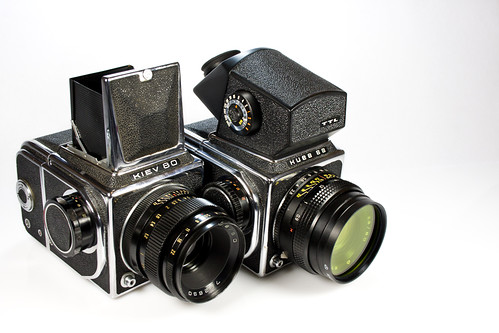
|
| Kiev 80 and Kiev 88 image by bottledog (Image rights) |
After World War II, much of the tooling at the Zeiss factory was appropriated by the Soviets and installed in the Ukraine, at a defense factory in Kiev known as Arsenal. Arsenal is best known for having cloned some notable cameras, including models by Hasselblad, Zeiss Ikon, and Pentacon. Most of them were not copied directly, but were instead simplified for production behind the Iron Curtain. Some, such as the Contax clones, were quite good. Arsenal also created one of the most original of all cameras: the Kiev 10. Of all Soviet camera manufacturers, Arsenal also has the largest cult following, given their product complement of cheap yet usable medium format equipment.
Contents
The Arsenal factory produced all Kiev (cyrillic: Киев) cameras. The most well-known camera produced at Arsenal is the Kiev 88 (derived from the original Salyut), which shares origins with the original Hasselblad 1000 F and 1600F. Who borrowed whose design is the subject of endless debate, which you can read about in a number of places.
The Arsenal factory also made Mir and Arsat lenses, which were good Zeiss copies. Their ubiquitous quality-control problems notwithstanding, the Ukrainian lenses are quite good, and some of them are outstanding.
35mm
Rangefinder
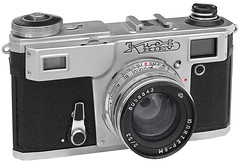
|
| image by Alf Sigaro (Image rights) |
SLR
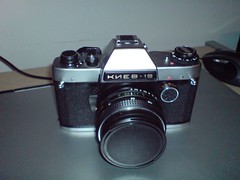
|
| image by nachopicapiedra (Image rights) |
- Kiev 15 TTL
- Kiev 17
- Kiev 17 M
- Kiev 18
- Kiev 19
- Kiev 19M
- Kiev 20
Fixed Lens
- Kiev 35
- Kiev 35A
- Kiev Exxell Automatic
Medium Format
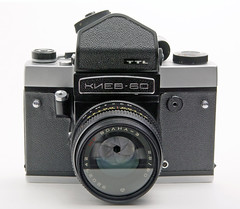
|
| image by Martin Taylor (Image rights) |
SLR
16mm Subminiature
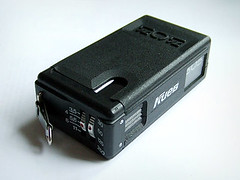
|
| Kiev 303 image by Siim Vahur (Image rights) |
Lenses
Medium format
| Name | Focal length | f-number | Mount | Angle of view | Type |
|---|---|---|---|---|---|
| Zodiac-8 | 30 | 3,5 | C and Kiev-88 | 180° | Fisheye lens |
| Mir-26 | 45 | 3,5 | C and Kiev-88 | 83° | Wide-angle |
| Mir-3 | 65 | 3,5 | C and Kiev-88 | 66° | Wide-angle |
| Mir-38 | 65 | 3,5 | C and Kiev-88 | 66° | Wide-angle |
| Industar-29 | 80 | 2,8 | Kiev-88 | 44° | Standard lens |
| Volna-3 | 80 | 2,8 | C and Kiev-88 | 44° | Standard lens |
| Vega-12 | 90 | 2,8 | C and Kiev-88 | 47° | Standard lens |
| Vega-28 | 120 | 2,8 | C and Kiev-88 | 31° | Telephoto |
| Kaleinar-3 | 150 | 2,8 | C and Kiev-88 | 28° | Telephoto |
| Jupiter-36 | 250 | 3,5 | C and Kiev-88 | 19° | Telephoto |
| Telear-5 | 250 | 5,6 | C and Kiev-88 | 18° | Telephoto |
| Tair33 | 300 | 4,5 | C and Kiev-88 | 15° | Telephoto |
| ЗМ-3 | 600 | 8,0 | C and Kiev-88 | 7,5° | Mirror lens |
Kiev-Automat
| Name | Focal length | f-number | Type |
|---|---|---|---|
| Mir-20 Automat | 20 | 3,5 | Ultra wide angle lens |
| Mir-1 Automat | 37 | 2,8 | Wide-angle |
| Helios-65 Automat | 52 | 2,0 | Standard lens for early «Киев-10» |
| Helios-81 Automat | 50 | 2,0 | Standard lens |
| Jupiter-9 Automat | 85 | 2,0 | Portrait lens |
| Jupiter-11 Automat | 133 | 4,0 | Telephoto |
| Rubin-2 Automat | 45~80 | 3,5 | Zoom lens |
| Granit-11 Automat | 80~200 | 4,5 | Zoom lens |
Notes
Bibliography
- Princelle, Jean Loup (2004), The Authentic Guide to Russian and Soviet Cameras ('Made in USSR'), Le Reve Edition. ISBN 2952252106; or the earlier edition: Hove Foto Books, 2nd edition, 1995. 200 pages. ISBN 1874031630. Paperback.
Links
- Arsenal company homepage
- ARAX company upgrades and sell worlwide the Arsenal production
- Arsenal Cameras at USSRPhoto.com
- Wikipedia's Arsenal company history
- Rick Denney's Kiev camera page
- Alfred Klomp's page of Soviet logos
- Kiev Cameras Price Guide at CollectiBlend
- Kiev pages at Antique Russian Camera
- 35mm Kiev rangefinders at Communist Cameras
- Arsenal page at Collection G. Even's site.
- web site of the Kievaholic Klub
- Cameras and User manuals at www.collection-appareils.fr (in French)
- Russian camera instruction manuals including Fed, Kiev, Zenit and Lubitel
- 35mm SLRs on Photohistory.ru illustrates many Kiev SLRs (in Russian)
- Red Salyut at Classic Cameras by RaúlM.